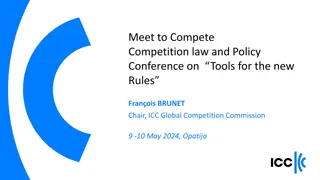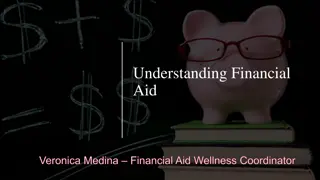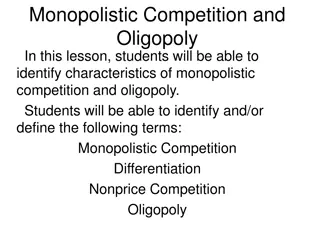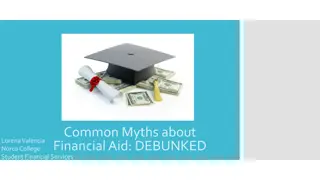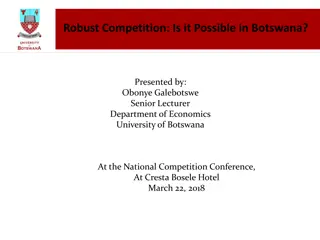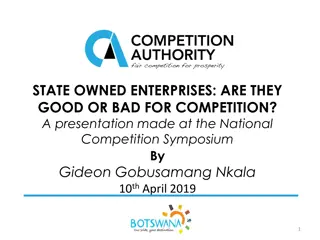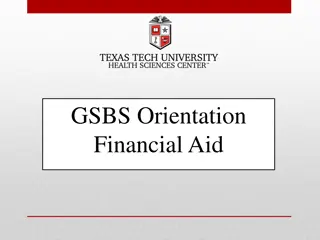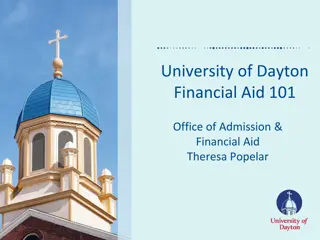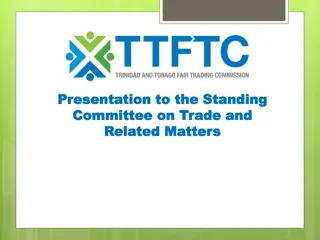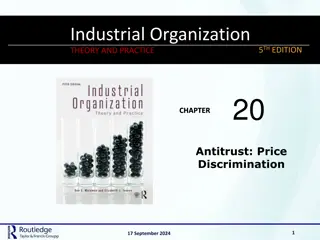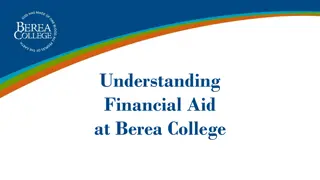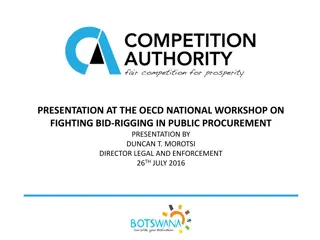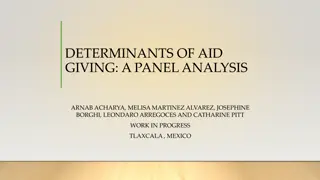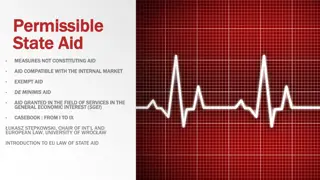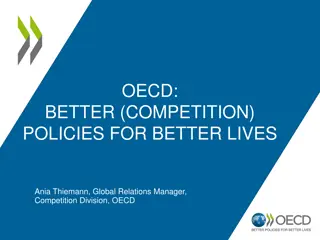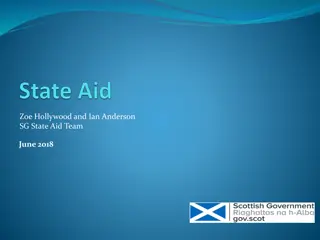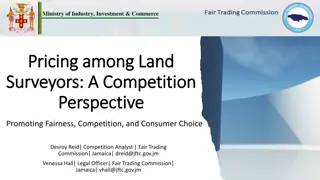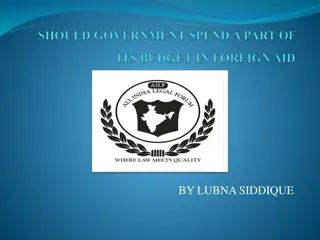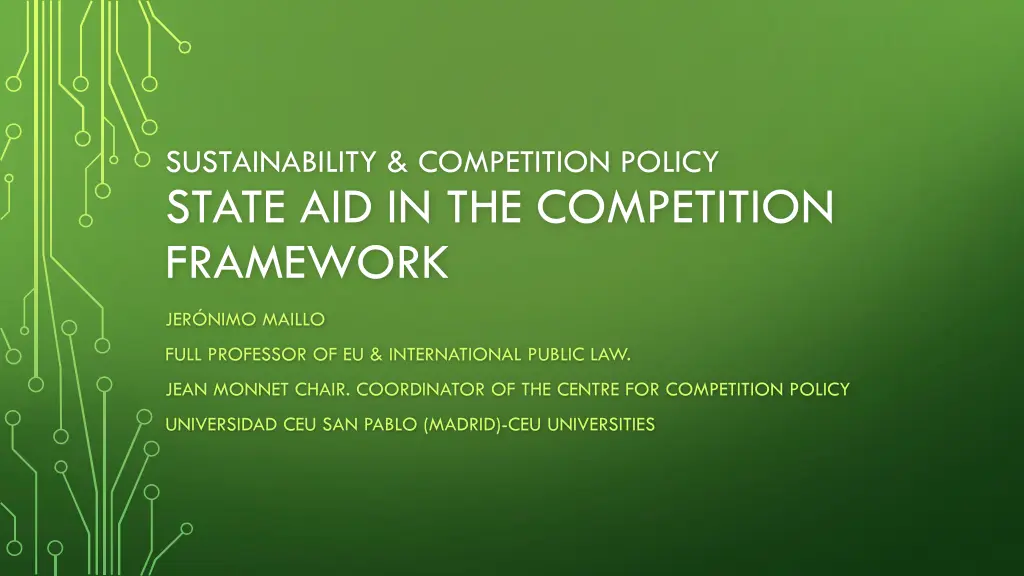
EU State Aid Control: Greening Policies & Competition Framework
Explore the intersection of sustainability, competition policy, and state aid from the perspective of Jerónimo Maíllo, a full professor of EU and international public law. Learn about the urgency of addressing climate change, the role of competition policy, and the necessary reforms in EU state aid control to promote a greener society and economy.
Download Presentation

Please find below an Image/Link to download the presentation.
The content on the website is provided AS IS for your information and personal use only. It may not be sold, licensed, or shared on other websites without obtaining consent from the author. If you encounter any issues during the download, it is possible that the publisher has removed the file from their server.
You are allowed to download the files provided on this website for personal or commercial use, subject to the condition that they are used lawfully. All files are the property of their respective owners.
The content on the website is provided AS IS for your information and personal use only. It may not be sold, licensed, or shared on other websites without obtaining consent from the author.
E N D
Presentation Transcript
SUSTAINABILITY & COMPETITION POLICY STATE AID IN THE COMPETITION FRAMEWORK JER NIMO MAILLO FULL PROFESSOR OF EU & INTERNATIONAL PUBLIC LAW. JEAN MONNET CHAIR. COORDINATOR OF THE CENTRE FOR COMPETITION POLICY UNIVERSIDAD CEU SAN PABLO (MADRID)-CEU UNIVERSITIES
(1) SETTING THE FRAME: PREMISES -Emergency & Seriousness of climate change crisis. Biggest challenge for humanity -All tools and policies. Competition policy not more than a supporting role (complementary role). Regulation is often a better and more important tool. If too lenient in competition, maybe an excuse for governments not to regulate (and contribute to inequality). -Competition authorities not well placed to make controversial political value-judgments (higher prices for social objectives). But the European Commission special status? -Sustainability is another driver for competition (important driver that had to be promoted). Pay attention not to disincentive it. -Action by both governments and businesses. Governments cannot do everything. Business encouraged: Green Deal + article 11 TFEU. BROADER MARGIN IN STATE AID -If Public aid, not the same if EU or National -Importance of legal certainty (guidelines). Very important for business. But need of studying case by case.
(2) SETTING THE FRAME: CRITERIA Not about whether to consider environmental benefits but about how. How to articulate all this in the different provisions, their interpretation and enforcement? How can this change (or adjustment) contribute to a greener society? e.g. To what extent should business be allowed to cooperate to fight climate change under article 101 TFEU? Phase-out products and methods that contribute excessively to climate change? Agreements to produce more energy-efficient goods, even if higher prices for consumers and reduce choice? -Genuine and proportionate pro-environmental business initiatives should be cleared up. But Not excuse for collusion or greenwashing (skepticism, real cases, tendency to collusion -spillovers)
(3) HOW TO GREEN THE EU STATE AID CONTROL AND WHICH REFORMS WERE NECESSARY? TRENDS 1- Reforming the Energy and Environmental State aid Guidelines (EEAG) of 2014. (the new 2022 Guidelines) 2-Reforming further the GBER 3-Review of the whole portfolio of state aid rules: check if in line with the green goals
(4) REFORMING THE GUIDELINES OF 2014: HOW? -Enlargement of the scope: new areas (industry decarbonisation, clean mobility, circularity, biodiversity), new technologies (renewable and low carbon hydrogen, e-storage), higher amounts of aid (100% financing gap) and new aid instruments (CCfDs). -Flexibilisation of compatibility rules (simplifying assessment of cross-cutting measures (energy efficiency and renewables in buildings) and excluding individual notification of green projects within approved schemes: BUT: -Safeguards: effectively directed to environmental goals, indispensable, minimum distortion of competition and Single European market -Guide governments away from investments that use the most polluting fossil fuels, like coal or lignite or oil. And even for gas, the rules will discourage support that s more than a strictly temporary solution. -Some other innovative & highlighted techniques:More inclusive state aid procedure, More transparency of environmental protection impact, More transparency of environmental protection impact, expost evaluation
(5) REFORMING THE GBER AND OTHERS -GBER: Already expanded the scope of the general block exemption regulation, creating new ways for governments to invest in green infrastructure, like charging stations and energy efficiency. -Plan to expand the block exemption even further (New articles for new measures, Increased threholds, Higher aid intensity) -OTHERS: E.g. rules on important projects of common European interest: greener batteries, hydrogen E.g. Regional aid (fair transition)

